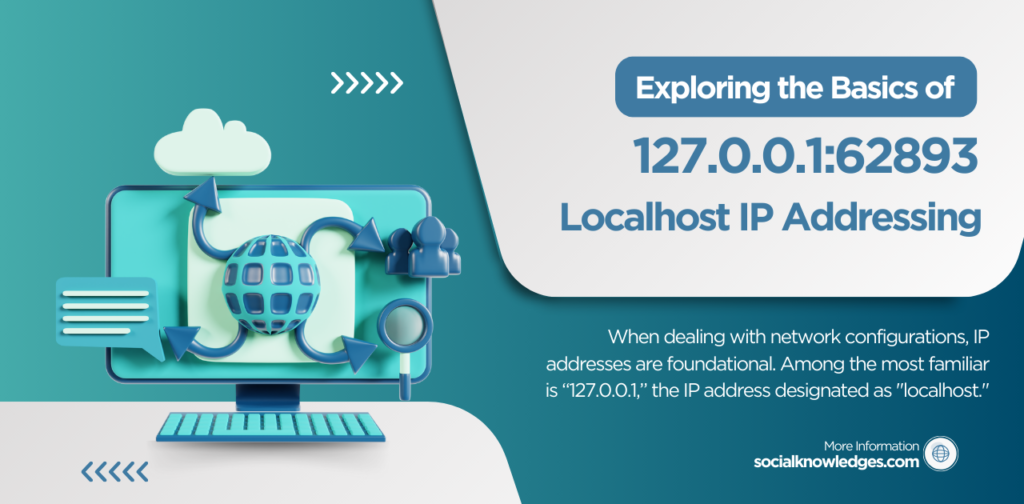When dealing with network configurations, IP addresses are foundational. Among the most familiar is “127.0.0.1,” the IP address designated as “localhost.” This IP address, often combined with a port number, is a loopback address that helps direct data within the same machine, ideal for software testing and debugging. Today, we’ll dive into the meaning behind “127.0.0.1:62893” and its significance in web development, network testing, and software debugging.
What is 127.0.0.1?
The IP address “127.0.0.1” is the standard loopback address in the IPv4 protocol. This address is used exclusively within a local system, meaning it routes traffic back to the device that originated it. The main purpose of this address is to enable testing and development without external network dependencies.
Understanding Ports in IP Addressing
While IP addresses like 127.0.0.1 route data to the correct device, ports ensure it reaches the intended software application. Ports function as channels that allow simultaneous communication across different applications, each assigned a unique port number. In “127.0.0.1:62893,” the number 62893 represents a specific port.
What Does 127.0.0.1:62893 Mean?
In “127.0.0.1:62893,” “127.0.0.1” represents the loopback IP, and “62893” is a port number used for specific communications. This combination allows applications running on the same computer to exchange information without requiring an internet connection.
The Role of 127.0.0.1 in Localhost Testing
Localhost IP addresses like 127.0.0.1 are essential in network testing and software development. They allow developers to run web servers and other network services locally, enabling them to troubleshoot and debug before going live. This process saves time and ensures stability.
Loopback Interface in Operating Systems
The loopback address 127.0.0.1 is universally recognized across operating systems, though each OS may have unique ways of handling network requests. Linux, Windows, and macOS all support loopback functionality for 127.0.0.1, ensuring compatibility across development environments.
How Ports Work with Localhost (127.0.0.1)
Ports allow multiple applications to run network operations concurrently. Port 62893, for instance, might be used by a specific development tool or server instance. Ports range from 0 to 65535, with certain ranges designated for specific protocols, but high-numbered ports like 62893 are typically available for custom purposes.
Security Implications of Using 127.0.0.1
Using 127.0.0.1 for testing is generally secure, as the traffic does not leave the device. However, security should still be a priority. Misconfigured localhost services could expose data, especially if there’s access beyond the loopback interface.
How to Access 127.0.0.1:62893
To access 127.0.0.1:62893, enter it in your web browser or terminal. If the service is running, you’ll see its response. Ensure that the software associated with this port is active; otherwise, you may encounter errors.
Applications and Software Using 127.0.0.1:62893
Many applications use the 127.0.0.1 address during development. Web servers, database servers, and application development tools frequently utilize this configuration for testing purposes.
Benefits of Using 127.0.0.1 for Development and Testing
The main advantage of using 127.0.0.1 is the controlled environment it provides. Developers can simulate different network interactions locally, leading to faster debugging and reduced reliance on external networks.
Understanding TCP/IP and HTTP Communication on Localhost
TCP/IP and HTTP protocols work seamlessly with localhost addresses. HTTP requests to 127.0.0.1 route internally, and TCP/IP helps in handling the connection. This combination is often used in web development and local API testing.
Using 127.0.0.1:62893 in Web Development
Developers commonly use localhost addresses to set up local versions of their websites. Tools like XAMPP or MAMP use 127.0.0.1 to create a local server environment, allowing safe, private testing.
The Role of Firewalls with Localhost Traffic
While firewalls protect your system, they often exclude traffic originating from localhost. You may need to configure firewalls to allow specific ports for local testing.
Conclusion
The address “127.0.0.1:62893” highlights the significance of localhost IPs and custom ports in software development and testing. With advancements in network configurations, using loopback addresses for local testing remains crucial for developers.
FAQs
Q: What is the purpose of 127.0.0.1?
Ans: 127.0.0.1 allows a device to direct traffic back to itself, useful in network testing and debugging.
Q: Why do developers use high-numbered ports like 62893?
Ans: High-numbered ports avoid conflicts with system-assigned ports and provide flexibility for testing.
Q: How secure is localhost for testing?
Ans: Localhost traffic is secure as it remains on the device, though care should be taken with service configurations.
Q: Can 127.0.0.1 be used over the internet?
Ans: No, 127.0.0.1 is strictly for local use and isn’t routable over the internet.
Q: What are common errors when accessing localhost?
Ans: Common errors include service not running, port conflicts, and firewall settings blocking access.


